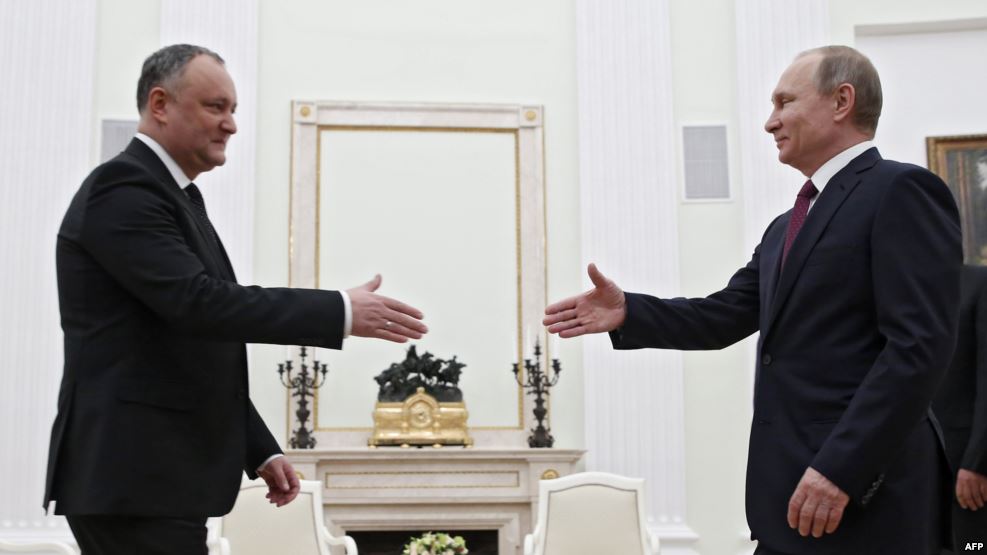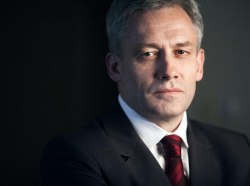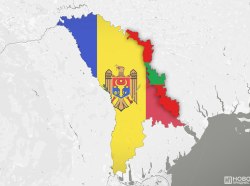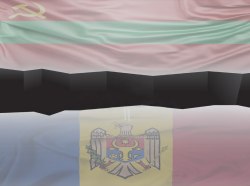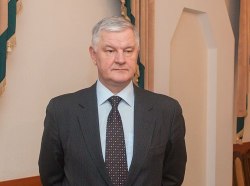Tiraspol, 18 January. /Novosti Pridnestrovya/. During yesterday's meeting, Russian President Vladimir Putin and his Moldovan colleague, Igor Dodon, discussed among other things the issue of the Moldo-Pridnestrovian settlement. Igor Dodon reiterated that the PMR was part of Moldova; Putin, in turn, though expressing confidence that the conflict must be resolved within the territorial integrity of Moldova, underscored that a compromise solution to this problem should suit the two sides of the negotiations. The Russian leader also praised the meeting between the presidents of Ppridnestrovie and Moldova, which took place in early January, noting that Igor Dodon needed certain courage to visit Bendery.
Novosti Pridnestrovie has interviewed several experts in the field of Russia's foreign policy and Moldo-Pridnestrovian settlement on what a thaw in relations, if not between Russia and Moldova as states, then at least between the presidents of the two countries, may bring to Pridnestrovie.
The Russian expert, historian and publicist Nikolay Starikov was very optimistic about the outcome of the meeting between Putin and Dodon. «Improved relations between Moldova and Russia automatically lead to the removal of tension between Moldova and Pridnestrovie. It is laudable that the new Moldovan leadership has paid its first visit to Moscow," noted the expert.
According to Starikov, if as a result of agreements reached by the two presidents Moldovan goods gain full access to the Russian market, and Russia simplifies rules for labour migrants from Moldova, Dodon will strengthen his position in Moldova to an extent that early parliamentary elections could be held following which the president will receive the support of both legislative and executive branches of power and will employ this powerful support to start negotiations on a comprehensive settlement of the Moldo-Pridnestrovian conflict.
«Of course, it is difficult to speak about the time of settlement because we must not forget about the existence of Russophobia-affected Ukraine between Russia, Moldova and Pridnestrovie, which complicates the political settlement," said Starikov.
However, according to the expert, if a compromise is reached in relations between Moldova and Pridnestrovie, this might be a platform for resolving the conflict in Ukraine.
The military expert and editor-in-chief of the National Defence magazine Igor Korotchenko was less optimistic. He suggests that winning the parliamentary elections Starikov talked about is the real aim of Dodon's meeting with Putin. «Dodon resolved issues related to Kishinev affairs only; it was very important for him to score as many political points as possible as a result of the meetings he held in Russia," Korotchenko believes.
According to the expert, Dodon's raising the subject of Moldo-Pridnestrovian relations is one of the ways of accumulating his political capital. Igor Korotchenko underscored that until Dodon's Socialist Party does not win the parliamentary elections by a landslide, there cannot be any significant progress in relations between Moldova and Pridnestrovie because Moldova is a parliamentary republic, and its president, though popularly elected, holds the post similar to the king's in a constitutional monarchy — «a lot of honour but no real power». At the same time, according to Korotchenko, without a change of power it is useless to discuss not only a comprehensive solution to the Moldo-Pridnestrovian conflict, but even a partial lifting of the economic blockade.
The same position is espoused by the Russian political expert and director of the International Institute of the Newly Established States, Aleksey Martynov. «Even if Dodon sincerely wants to resolve the Moldo-Pridnestrovian conflict — and I am sure he is sincere — he has very limited opportunities," says Martynov.
Igor Korotchenko believes that before establishing relations with Moldova, it is imperative that Dodon's allies win the majority of seats in the parliament because other political forces, including the ruling pro-European coalition, are impossible to agree with and will not make a compromise with Pridnestrovie. «As we can see, the current political regime in Moldova represents the interests of a major oligarch, a well-known gentleman whose surname begins with P. So, I don't think any compromise is possible prior to the parliamentary elections," says Korotchenko. According to Alexey Martynov, the regime controlled by Mr P. is not just oligarchic, but police-oligarchic.
Korotchenko supposes that after getting the Moldo-Pridnestrovian negotiations moving, Pridnestrovian residents will need not fear any longer that their country will become a bargaining chip in a big geopolitical game. «The future of Pridnestrovie will be determined by its own people, and for the time present, the citizens of the PMR seek integration with Russia," noted the journalist. Starikov and Martynov are also confident that a compromise solution to the conflict must take into consideration, first of all, the interests of Moldova and Pridnestrovie themselves.
«The Moldo-Pridnestrovian issue is a dispute between Tiraspol and Kishinev. The opinion that someone will resolve the conflict for Kishinev or Tiraspol is wrong and groundless," said Martynov.
According to Korotchenko, the ultimate settlement of the conflict can be reached by establishing a confederation both members of which will be sovereign and independent states. Martynov notes that the establishment by the two Moldavian states, Moldova and the PMR, of a common economic and cultural space would be more viable and realistic. To achieve this, however, Kishinev should grant Pridnestrovie maximum sovereignty. The expert believes that this does not include any «unfulfilled» projects to resolve the conflict through federalisation and even by establishing a confederative state, which is favoured by Korotchenko.
«Solving the problem today lies in the recognition of the PMR by official Kishinev as the second Moldavian state, based on which it is necessary to build the common Moldavian space, proceeding from the word Moldavian, in other words from the letter M, which still exists in the abbreviation PMR," emphasised the expert.
However, like other experts, Alexey Martynov notes that the implementation of this scenario will require a complete change in the distribution of political forces in Moldova, and Dodon's allies must not only win the majority of parliamentary seats, but a constitutional majority. According to the expert, this is hard to achieve amid split society where Dodon had a narrow victory in the past presidential election, ensured among other things by almost 15,000 votes of the Pridnestrovians who took part in voting.
Alexey Kovalev.

